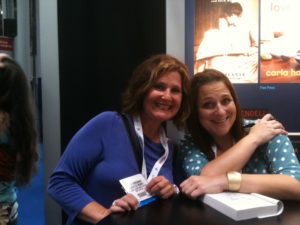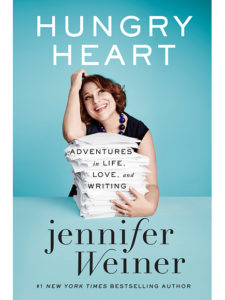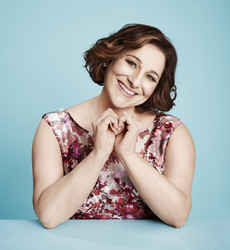Q&A With NYT Bestselling Author Jennifer Weiner, My New BFF
In Jennifer Weiner’s new memoir, Hungry Heart, this NY Times bestselling author is, well, an open book. And when Weiner has something to say, people listen (her social media posts are a viral sensation). This outspoken novelist, feminist, humorist, columnist, live tweeter, political activist, and Jewish mom holds nothing back in her new memoir, her first foray into nonfiction, and is sure to satisfy, even surprise her readers.
Her books have spent more than five years on the NY Times bestseller list with over 11 million copies in print in 36 countries. In addition to a collection of short stories, she has written 14 novels, including In Her Shoes, which was turned into a Hollywood movie starring Cameron Diaz, Toni Collette, and Shirley MacLaine, and continues to rank as a favorite chick flick. (Her Nanna plays an extra in the movie!)
Although her widely acclaimed books fall into the chick lit category, her adoring fans know her stories are so much more, and even literary critics can’t deny that Weiner’s real-life characters and fairy tale endings resonate with the largest population of book-buyers. On October 19, 7:30 pm., Weiner will pack the house as she divulges her raw, personal life in her newly released Hungry Heart, at the 38th annual STL Jewish Book Festival. Both hilarious and heartbreaking, her memoir will make you laugh out loud—such as the chapter about her mom Fran coming out as a lesbian during the Passover Seder (why is this night different from all other nights?!)—and other pages will provoke the ugly cry—such as when she describes the agony of suffering a miscarriage in her bathroom. In other words, Weiner is as real as it gets, and that’s what makes her so appealing.
Weiner, whose named is pronounced Whyner (as in kvetchy) and not Weener (like the hot dog), is a smart, funny, Jewish writer whose voice is akin to the women she grew up reading—Erica Jong, Nora Ephron, and Frank Lebowitz. These literary mentors inspired the Princeton grad to always remain true to herself, not only as an author, but as a wife, daughter, sister, friend, and mom to Phoebe, 8, and Lucy, 13.
On the heels of her whirlwind book tour of her first children’s novel, Littlest Bigfoot, also for sale at the event, we recently got together and chatted over green tea lattes. Not really, we exchanged emails, and here’s what she had to say:
Q: “You fall down. You get hurt. You get back up again†is the opening scene of Hungry Heart and the theme in your life. What is it about you that makes you a survivor, and in turn, a huge success and inspiration to so many women.
A: First of all, thank you for the compliment!
I think, like many women, I am who I am because I didn’t have a choice. I had to help take care of my siblings after my dad left out of necessity. I felt compelled to speak out about sexism and inequality at Princeton and elsewhere because, for some reason, a desire for fairness is part of my hard wiring. So is candor, which is why the whole world will soon be able to read all about my miscarriage.
And, as far as being an inspiration, I think what women see when they see me is someone who isn’t perfect, someone who’s still struggling, someone who makes mistakes, and then tries to pick herself up and keep going and make different mistakes the next time. Maybe that’s inspiring and also relatable – the idea that I’m not this polished, gorgeous, eternally Photoshopped star who’d never show you a picture of her messy hair or messy living room. I’m flawed, but I’ve also managed to make a nice living doing what I love, and I’ve made a life that works and found a man who loves me.
Q: In your memoir, you let it all hang out. Many chapters are laugh out loud funny, such as when your Nanna plays an extra in the movie In Her Shoes, and your essay in the Philadelphia Inquirer about gefilte fish is a classic. And some chapters evoke the ugly cry, such as when you describe the raw details of your miscarriage in your bathroom. What are readers going to be surprised most to find out about you after reading this book?
A: After my publicist read this book, she called me and said, “Jen Weiner (which is what she calls me), I feel like I really know you.†And I said, “But you’ve known me for years!†It’s hard to say what’s going to surprise people. Certainly, learning the details of my father’s life and death were a huge surprise to me.
Q: Do you see your books eventually bridging the gap between commercial and literary fiction?
A: I wish. But I think I’m going to be a little like Moses, in that regard. Someday I might see the Promised Land, but at this point I feel like I’ve been placed so firmly in the “frivolous and disposable†box that there’s no hope of ever climbing out. Unless I write under a pseudonym!
Q: Your success has come from a lot of hard work and word of mouth from readers who see themselves in your characters and stories. Unlike other writers, do you feel like your success has longevity because you don’t rely on the critic’s approval but rather the relationship you have built with your fans?
A: I can point to any number of writers – ironically, many of them Oprah picks – who’ve had huge bestsellers, thanks to some outside force, whether it was a critic, or a talk show, telling people “read this book.†Then, when they publish the follow-up, and there’s nobody issuing that directive, the book flops.
As much as it’s natural to hope and pray for that Oprah love, or the cover of the New York Times Sunday book review, I think that it’s much better to build a career from the ground up.
Q: After writing more than 15 novels, why did you decide now is the time for a memoir?
A: Long story short – my publisher asked me. Initially, the plan was to publish a collection of pieces that had already been in print, plus a few of the stories I’ve told over and over – how did you write your first book? Where do you get your ideas? What was it like to have a book made into a movie?
I turned in a draft, and then thought it over, and realized that I was 45, which felt like kind of a mid-point. Here I am at the halfway mark, I thought. What have I learned? What stories can I tell that might help women feel less alone, more at home in their own skin, and in the world? I asked for the manuscript back, and decided to write like no one would ever read it…and then, when it was clear that other people were, in fact, going to read it, I told myself that telling these stories might make other women feel less alone.
Q: While on book tour, you also just announced that your first children’s book Littlest Bigfoot is going to be made into an animated film—congratulations! You talked about how making the movie In her Shoes was a wonderful experience, filmmakers stayed true to the integrity of the original story, including the Jewish characters, and fans loved it. You also say how you felt personally responsible when the movie wasn’t a box office hit in terms of revenue. How do you feel about Littlest Bigfoot hitting the big screen?
A: I’m trying to be realistic about its chances. Lots of books that get optioned don’t get made. But I’m hopeful that we found the right people to do it, and that Millie and Alice will make it to the big screen looking the way I imagined they would.
Q: Back to Hungry Heart… Throughout the book, you reference your Jewish upbringing, including Nanna’s famous ruggalah, about your mom teaching you the mitzvah of visiting sick relatives, the value of a good education, how you had a Jewish wedding with your first husband. How has being Jewish, including the times you felt alienated by your own tribe as a teenager, influenced your writing?
A: Being Jewish means that you’ll always be an outsider – which is a real blessing for a writer. Outsiders are observers. We are always trying to figure out what’s going on with the insiders, and how they got to be the way they are, and we can see situations from our own unique perspective. And I think that being Jewish has given my stories a richness and a specificity that resonates with Jewish readers, and which seems delightfully exotic to non-Jews.
Q: You also mention the Talmudic teaching that obligates parents to teach our children to swim, the metaphor for letting go. (Which reminds me of how your mom taught you and your daughters how to ride a bike, without pedals!) How has Judaism influenced the way you are raising your kids? And do you have a favorite Jewish holiday or tradition that you share with your family now?
A: With my own children, I think a lot about privilege, and the obligation of tikkun olam. My ex and I have chosen to raise our girls in a city, where they see inequity every time they step outside their door, and know, in a visceral rather than a theoretical way, how much work there is to be done. We volunteer, and we give to charities, and we talk a lot about what money is for, and the obligations that come with having enough of it.
And we celebrate all the Jewish holidays, and I love them all, for different reasons, but Passover is very special to me, because, for years, my Nanna would make the gefilte fish, by herself, from scratch (and then put it in a cooler, and wrap the cooler in garbage bags and label them ‘FISH’ when she checked them at the airport). Then she started making it with me and my mother, and my daughters – I have beautiful pictures of Nanna and Phoebe grinding fish together. The past few years, I’ve made the fish by myself, and it’s always a very funny scene in Whole Foods, with me explaining that yes, I need the heads, and the skin, and the bones. It lets me feel connected to my Nanna, and puts me in mind of all the traditions that are passed down from generation to generation.
Q: And when it comes to parenting, Fran speaks these words of wisdom, “It doesn’t have to be perfect. It just needs to be good enough.†How has your mom’s advice helped you get through the challenges of balancing work and family?
A:  I’ve learned to forgive myself, and try to move on from my mistakes, and consider the evidence to the contrary when the voice in my head tells me I’m a failure. Lucy is fine, even though she wasn’t breast fed! Phoebe’s okay, even though she got sent home from camp with a broken wrist! And in terms of the balancing, what works for me is being really honest about all the help it takes for me to do what I do. I have a nanny, and an assistant, and someone who cleans and does laundry, so that I get to spend my time writing, or being a mom. I think that we as women are taught that there’s something shameful about needing help, whether it’s paying for child care or not being able to figure out breast feeding by ourselves….especially when so many celebrities talk about not needing nannies or not having sitters. I want to wave the flag for the rest of us. I DID have a nanny! And a housekeeper! And a practically live-in lactation consultant, and a doula who stayed overnight for the first three months of my second daughter’s life, and I was happy, sometimes, to hand that screaming newborn off to someone else.
Q: You write about the many colorful characters in your life… your Nanna, your parents, your sister Molly, your boyfriend Bill who is now your husband, even your dog Wendell inspired Cannie’s little rat terrier in Good In Bed. What are some of your favorite characters that come from your real life?
A: I don’t think I can pick favorites! My daughters are wonderful, but I try to be very circumspect in writing about them. Some day, they will have their own stories to tell, and I want them to be their stories, not mine.
Q: To this day, even though you struggle with your own weight like most of us do, you seem to have come to peace with your body, and in doing so you inspire thousands of women in all shapes and sizes to love their bodies. For example, you created a “smorgasbord of positivity†in the  #WearTheSwimsuit social media campaign by encouraging women to post their photos on Facebook. How does this overwhelming response make you feel, and what message do you want to send to your daughters about healthy body image?
A: I cannot tell you how overwhelming it was to see all of those pictures, and how personally it affected me. I remember, years ago, when Glamour used a model who had a tiny little tummy roll, and it was such big news that she wound up on “The Today Show.†I remember seeing her picture and thinking, “Wait, other people have those? We’re allowed to have those? It’s okay?â€
Seeing all of those women in their swimsuits, all of those bodies that looked like mine, or my mother’s, all of those women with smiles on their faces, in the water, with their kids or their friends or their nieces and nephews, just enjoying themselves was remarkable. It made me feel more acceptable in my own skin. And I’m saving those pictures in a scrapbook for my daughters, which I will casually leave around the house for their perusal. Because the more quote-unquote “normal†bodies we look at, whether they are athletes or actresses or plus-size fashion bloggers, the more we realize that there truly is a range of bodies out there in the world, and that all of them are okay
Q: What does Hungry Heart mean to you?
A: Hungry Heart means that we’ll always want something – food, love, success, respect, attention. Like I say, yearning is the human condition, and what drove us to develop fire, and the wheel, and Instagram. What does it mean to me? That I’ll always want, and that maybe I’ll never feel as if there’s a finish line, and I’ve crossed it, and that it’s going to be the work of the next half of my life to tell myself that I actually am doing what I’m supposed to do, and have gotten where I’m supposed to be.
Q: And finally, you have always loved to read and write and tell a story. As a young girl, books were an escape from your own ordinary life and you love to create imaginary worlds where the heroine is a real size (yes, fat) and still gets the guy, the promotion, the money, the success, the happily ever after that she deserves. Would you say the fictional world you create reflects your real life today, with a loving husband, two daughters, and a successful career?
A: The epigraph of the book is “I wrote my way out.†In GOOD IN BED, I had Cannie marry her deep-voiced doctor, and, together, they raised a daughter that wasn’t biologically his (and then he dies in the sequel, which had better not happen here!) I think there is some magic to writing your own happy ending, to imagining it in all of its specific glory, and writing it down, and putting it out into the universe. I got my happy ending – even at my size, and even with all of the sorrow and mishegoss that came with it – and I hope that my example means that other women can, too.
Get your tickets HERE!  and see you there!




